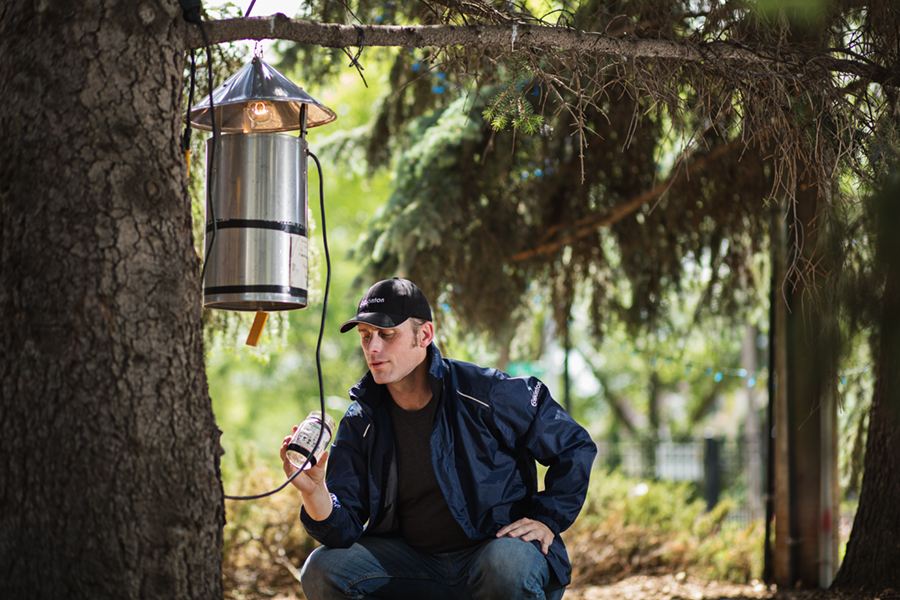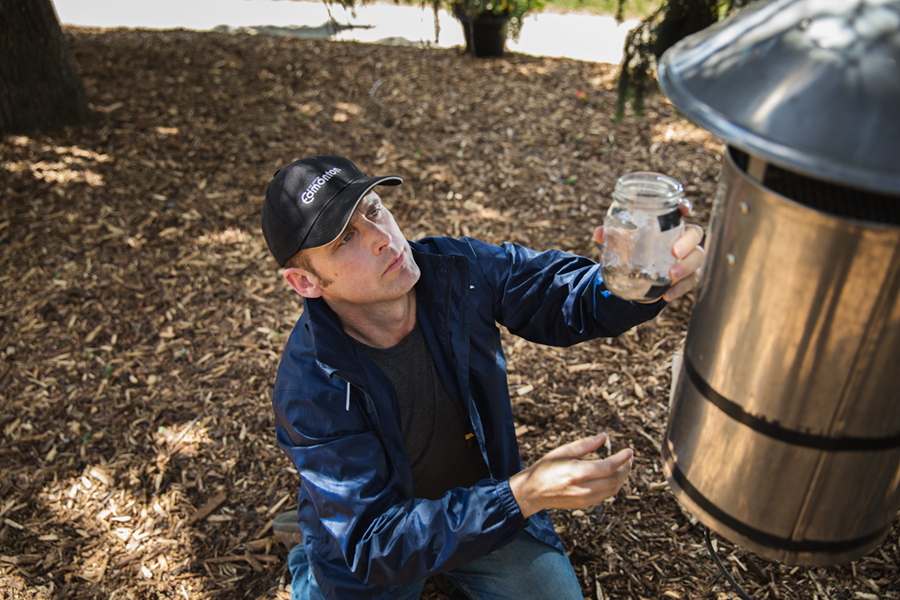Summer in Edmonton sometimes bites
When the weather turns warm, Edmontonians turn to the great outdoors – to backyards, patios, parks – and, whether we like it or not, to mosquitoes.
Some 30 different species can be found around the city, each developing at different times during the summer. The good news is they have a lifespan of only a few weeks. The bad news? They can reproduce in six days, ensuring a steady supply of blood-sucking critters throughout the warm months.
“Hot and wet generally equals more mosquitoes.”
We talked to Peter Daly (Biological Sciences Technology – Renewable Resources ’03), a biological sciences technologist with the City of Edmonton, about how the mosquito season works and, most importantly, how to protect ourselves from being eaten alive.

Are we seeing more mosquitoes during the daytime?
All mosquitoes are most active at dawn and dusk, but we are seeing some species now, such as Ochlerotatus spencerii, that are more heat-tolerant, so they’re around during the day too. “Whereas other mosquitoes will shrivel up into little six-legged winged raisins very quickly in the heat of the day, these ones can tolerate being out in it quite a bit,” he says.
Are we doomed to a mosquito-filled summer?
No! “What happens now has very little bearing on what happens later in the summer because it’s so dependent on weather,” says Daly. “Hot and wet generally equals more mosquitoes. Cold weather means they develop more slowly; dry weather means they have fewer places to develop.”
When is peak time for mosquitoes?
The end of July and early August is peak mosquito season.
What can I do to stop mosquitoes from breeding in my yard?
Mosquitoes probably aren’t breeding in your yard. The mosquitoes we see now are most often developing from eggs that were laid in past years and are reactivated by exposure to water, says Daly. They develop in temporary shallow pools with vegetation, like divots in farmers’ fields. That said, it’s a good idea to get rid of standing water in your yard.
“There’s no sense in making them comfortable, even if they’re not likely to reproduce there,” says Daly.
I planted citronella in my yard. Will that get rid of mosquitoes?
Citronella oil is a mild mosquito repellant, but to get any benefit from the plant you’d have to mulch it and spread it all over the yard to activate the oil, he says. “Just the plant sitting there isn’t going to do a thing – mosquitoes will happily land on it,” he adds.
How can I keep the mosquitoes away?
- Mow your lawn. “That gives them fewer places to hide out during the day because they appreciate those dark, humid, cool places,” says Daly.
- Try to avoid activity at dawn and dusk, when mosquitoes are most active.
- Wear light-coloured clothing. Mosquitoes hone in on prey using heat detection, and darker clothes absorb more heat.
- Use a repellant that contains DEET, but don’t use it near your lips, nose or eyes.

Do mosquitoes really like some people better than others?
Yes, some people’s natural odour attracts mosquitoes more than others. They’re also attracted to the carbon dioxide you exhale, and to heat. So if you’re sweating and huffing after a run, they’ll likely come around.
Can I catch anything from mosquitoes in Alberta?
Yes, there is an “incredibly slim” chance of getting West Nile virus from mosquitoes in Alberta, says Daly. The type of mosquito that carries it – Culex tarsalis – is uncommon, and is found more in late July and early August. It’s prudent to be aware of the possibility, but not to worry too much, he adds. (But if you are worried, Alberta Health has more info.)
Why don’t we use dragonflies and bats to combat mosquitoes naturally?
While dragonflies and bats do eat mosquitoes, they wouldn’t work as a bio-control, says Daly. Dragonflies are most active during the day, while mosquitoes are most active in the evening. Plus mosquitoes make up only a small part of the diets of dragonflies and bats. Breeding dragonflies would also be very difficult and expensive.
So wouldn’t we all be better off if mosquitoes were wiped off the planet?
“People have had that sort of hubris before and it has almost always come back to bite us in the butt,” says Daly.
“Eliminating mosquitoes entirely – even if it was theoretically possible, and it’s essentially impossible – would likely have far-reaching effects that we can’t really predict. The concept of the ‘food chain’ is overly simplistic. It’s a food web where everything’s interconnected.”
